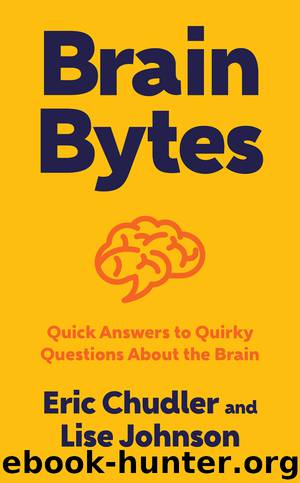Brain Bytes by Eric Chudler

Author:Eric Chudler
Language: eng
Format: epub
Publisher: W. W. Norton & Company
Published: 2016-04-04T16:00:00+00:00
References
Farahany, N.A., Neuroscience and behavioral genetics in US criminal law: an empirical analysis, Journal of Law and Biosciences, 1–25, 2016, doi:10.1093/jilb/lsv09.
Hu, X., Bergström, Z.M., Bodenhausen, G.V., and Rosenfeld, J.P., Suppressing unwanted autobiographical memories reduces their automatic influences: evidence from electrophysiology and an implicit autobiographical memory test, Psychological Science, 26:1098–106, 2015.
What is the relationship between the mind and the brain?
A
Clearly there is a relationship between the mind and the brain. We know this because if you destroy the brain, you destroy the mind. The body can be otherwise alive and healthy, but if the brain is dead, the person is dead. This is why brain death is synonymous with death, and why the organs of a brain-dead person can be harvested and used by others. This is not true for any other organ in the body.
Although we can confirm a robust relationship between the brain and the mind, we don’t know much more about the nature of that relationship. Part of the reason for this is that the mind is difficult to define. If you can’t even formulate a question, it is extremely hard to come up with an answer. How do you measure the mind? Most of us define consciousness the same way Supreme Court Justice Potter Stewart defined obscenity: we know it when we see it.
Of course, some scientists have tried to address the question of consciousness. As far as we can tell, the mind is an emergent property of the brain. This means that the individual cells are not conscious, but the interactions between them gives rise to consciousness. There is no “consciousness area” of the brain. Rather, different areas of the brain interact to produce self-awareness. This is why the mind is somewhat tolerant to brain damage. A fully functional brain is not necessary to have a mind. The important, and not at all hypothetical question is, how much (and which parts) of your brain do you need to be conscious? Sometimes we are not sure if a person is brain-dead, and knowing is a matter of life and death.
Is it possible that other animals have minds? It is not improbable. Is it possible that other, highly interconnected systems will achieve consciousness? How will we know? These are questions not only for scientists and physicians but for philosophers, ethicists, theologians, and legal scholars.
Download
This site does not store any files on its server. We only index and link to content provided by other sites. Please contact the content providers to delete copyright contents if any and email us, we'll remove relevant links or contents immediately.
Periodization Training for Sports by Tudor Bompa(8237)
Why We Sleep: Unlocking the Power of Sleep and Dreams by Matthew Walker(6684)
Paper Towns by Green John(5163)
The Immortal Life of Henrietta Lacks by Rebecca Skloot(4564)
The Sports Rules Book by Human Kinetics(4367)
Dynamic Alignment Through Imagery by Eric Franklin(4199)
ACSM's Complete Guide to Fitness & Health by ACSM(4040)
Kaplan MCAT Organic Chemistry Review: Created for MCAT 2015 (Kaplan Test Prep) by Kaplan(3993)
Introduction to Kinesiology by Shirl J. Hoffman(3753)
Livewired by David Eagleman(3753)
The Death of the Heart by Elizabeth Bowen(3596)
The River of Consciousness by Oliver Sacks(3589)
Alchemy and Alchemists by C. J. S. Thompson(3501)
Bad Pharma by Ben Goldacre(3411)
Descartes' Error by Antonio Damasio(3261)
The Emperor of All Maladies: A Biography of Cancer by Siddhartha Mukherjee(3133)
The Gene: An Intimate History by Siddhartha Mukherjee(3085)
The Fate of Rome: Climate, Disease, and the End of an Empire (The Princeton History of the Ancient World) by Kyle Harper(3046)
Kaplan MCAT Behavioral Sciences Review: Created for MCAT 2015 (Kaplan Test Prep) by Kaplan(2972)
